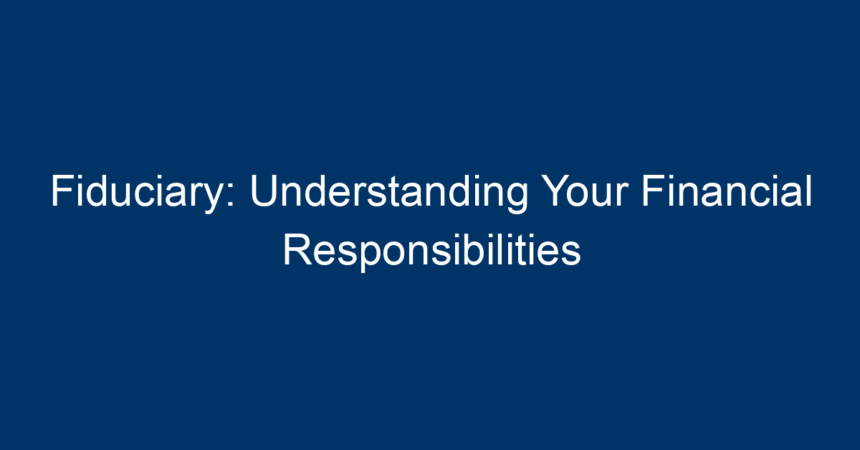Navigating the financial landscape can be daunting, especially when it comes to understanding the roles and responsibilities that come with managing someone else’s money. Enter the fiduciary—a term that embodies trust, responsibility, and obligation. In this article, we will explore the concept of fiduciaries, their importance in financial decision-making, and the responsibilities they must uphold. By the end, you’ll have a clearer understanding of what it means to be a fiduciary and how it impacts your financial future.
What is a Fiduciary?
A fiduciary is an individual or entity that is entrusted with the responsibility to manage another party’s assets, interests, or money. The term originates from the Latin word "fiducia," meaning trust. Fiduciaries are bound by both ethical and legal obligations to act in the best interest of their clients or beneficiaries. This relationship of trust is fundamental in various domains, such as finance, law, and investment management.
Types of Fiduciaries
Fiduciaries can take on many forms. Below are some common types of fiduciaries you may encounter:
-
Financial Advisors:
Financial advisors are perhaps the most recognized fiduciaries. They help you manage your investments, retirement plans, and wealth management strategies while adhering to a fiduciary standard. -
Trustees:
A trustee manages a trust—a legal entity that holds assets for the benefit of specific individuals, known as beneficiaries. Trustees must carefully manage these assets to fulfill their obligations. -
Attorneys:
Lawyers who handle client funds or estates operate under fiduciary duties, ensuring they act in their client’s best interest at all times. -
Executors:
Individuals named in a will to carry out its terms are considered fiduciaries. They manage the deceased’s estate, ensuring that debts are paid and assets are distributed appropriately. - Guardians:
When a person is appointed to take care of a minor or someone deemed incapable of managing their affairs, they assume fiduciary responsibilities.
The Fiduciary Duty Explained
Understanding fiduciary duty is essential for anyone engaging with financial advisors or other fiduciaries. This duty encompasses several key responsibilities:
-
Loyalty: A fiduciary must prioritize their clients’ interests above their own, avoiding any conflicts of interest.
-
Care: Fiduciaries must act with a high degree of care and prudence, ensuring that decisions are made with sufficient diligence and attention.
-
Full Disclosure: Transparency is paramount. Fiduciaries must keep their clients informed about any potential risks and the performance of their investments.
- Accountability: Fiduciaries should always be prepared to account for their actions and the management of assets entrusted to them.
Importance of Fiduciaries in Financial Planning
Adopting a fiduciary approach in financial planning can profoundly impact your financial well-being. Here are some reasons why fiduciaries are crucial:
1. Alignment of Interests
When you work with a fiduciary, their success is directly tied to yours. This alignment fosters trust and ensures that your financial goals are the primary focus, minimizing the potential for conflicts of interest.
2. Expertise and Professional Guidance
Fiduciaries are often financial professionals with expertise in tax law, investment strategies, and personal finance. Their guidance can be instrumental in making informed financial decisions that will benefit you in the long run.
3. Legal Protections
Engaging with a fiduciary provides an additional layer of legal protection. If a fiduciary fails to uphold their obligations, you may have legal grounds for recourse. This can offer peace of mind as you plan your financial future.
How to Choose a Fiduciary
Choosing the right fiduciary is a critical step in securing your financial future. Here are some factors to consider:
1. Qualifications and Credentials
Investigate their qualifications. Look for certifications such as Certified Financial Planner (CFP), Chartered Financial Analyst (CFA), or fiduciary designations. These credentials often indicate a level of expertise and commitment to ethical practice.
2. Reputation and Reviews
Research reviews and testimonials from clients. A fiduciary’s track record can give you insight into their reliability, expertise, and professionalism.
3. Service Fees
Understanding how a fiduciary is compensated is crucial. Fee-only advisors may have less incentive to recommend products that are costly, ensuring that their recommendations align with your best interests.
4. Open Communication
Choose a fiduciary who prioritizes communication. Your financial advisor should be willing to explain their strategies and decisions clearly and answer any questions you may have.
Common Misconceptions About Fiduciaries
-
All Financial Advisors Are Fiduciaries: Not true! Some advisors operate under a suitability standard, which only requires that they recommend products that are suitable for you, not necessarily in your best interest.
-
Fiduciaries Are Too Expensive: While some fiduciaries may charge higher fees, many offer value that outweighs costs. Investing in a fiduciary can yield better long-term financial returns.
- Fiduciaries Are Only for the Wealthy: Fiduciaries can provide value to individuals at any financial stage. Even those with modest portfolios can benefit from their expertise.
The Future of Fiduciary Responsibility
As awareness of fiduciary standards rises, there is a growing expectation for all financial advisors and institutions to operate under a fiduciary standard. Regulations may evolve to ensure more consumers receive the protection they deserve.
Actionable Insights
- Research Your Options: Take the time to understand different fiduciaries and their areas of expertise.
- Ask Questions: Do not hesitate to ask potential fiduciaries about their fees, qualifications, and how they plan to manage your assets.
- Stay Involved: Engage actively in discussions with your fiduciary. Monitor your investments and strategy regularly to ensure that they align with your financial goals.
- Educate Yourself: Understanding finances and investing can empower you to make better decisions, even if a fiduciary manages your assets.
Conclusion
The role of a fiduciary is more than just a job; it’s a significant commitment to act in the best interest of others. By choosing to engage with a fiduciary, you are not only entrusting them with your financial health but also ensuring that your interests are the priority. Whether it’s securing your retirement, managing a complex estate, or simply navigating investments, understanding the fiduciary relationship is crucial. As you embark on your financial journey, make informed decisions, communicate openly, and embrace the peace of mind that comes with choosing the right fiduciary for your needs. Your financial future deserves nothing less than the highest standards of care and responsibility.




